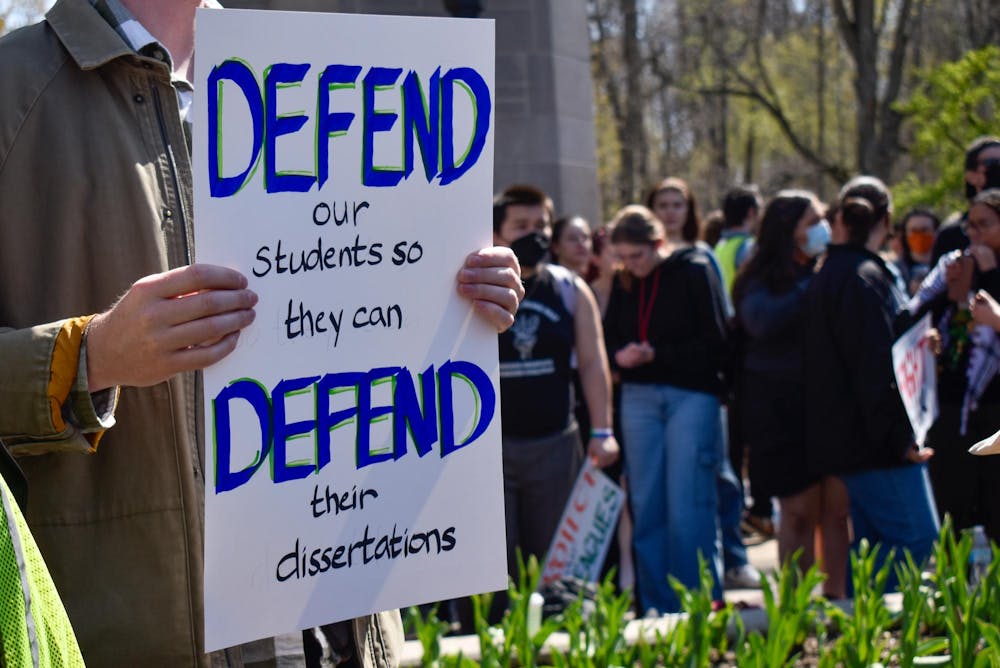Around 200 people protested the U.S. Department of State decision to revoke several Indiana University graduate workers’ visas Thursday around Sample Gates.
The protest comes after Provost Rahul Shrivastav announced Tuesday at a Bloomington Faculty Council meeting that a “small” number of IU students have had their student visas revoked. The Indiana Daily Student has not been able to confirm a total number of revoked visas, and the IU administration has not released further information.
Shrivastav said at the meeting that the university is working on a case-by-case basis to help students to the full extent it can while still complying with federal legislation.
Indiana Graduate Workers Coalition organizer Bryce Greene told the IDS at least two of the union members had their visas revoked. IGWC Press Officer David Garner said in a text to the IDS the union is not reporting a specific number of members who have had their visas revoked due to the safety and anonymity of their members.
“Rahul, be cool, let our friends go to school!” the protesters chanted.
Throughout the hour and a half-long demonstration, protesters including faculty, students and community members donned Keffiyehs, held signs and chanted while encouraging drivers to honk in solidarity. Some protesters wore masks as the crowd enveloped both sides of the Sample Gates. Organizers repeatedly asked attendees to keep lines open for passersby. Protesters also distributed food and flyers as speakers shared their anger and fear under the uncertainty of this process of visa revocation.
“Hey hey, ho ho, we don’t want our friends to go!” they chanted.
Protesters also called for the resignation of Shrivastav, President Pamela Whitten and Vice Provost for Faculty and Academic Affairs Carrie Docherty. Each faced a no confidence vote last April with faculty passing the vote with 93.1% against Whitten, 91.5% against Shrivastav and 75% against Docherty.
The IGWC organized the protest. The group announced the demonstration Wednesday on Instagram as “emergency action” after the provost’s announcement. The Palestine Solidarity Committee and IU Divestment Coalition also promoted the protest on their respective Instagram accounts.
Garner said the union wants to see the IU administration support its graduate workers by providing legal resources, honoring Student Academic Appointee contracts and continuing to pay students if they have to continue their academics overseas. Garner also stressed the emotional impact on the graduate workers who see their friends and community members have their legal status changed.
“So this really, really hurts,” he said. “International students are really nervous right now because we don’t know if this is just the beginning.”
The Guardian reported Thursday that the Trump Administration and DHS have revoked visas or changed the legal status of over 600 students at more than 100 colleges and universities. The IGWC anticipated the revocation of visas of international working students following this national trend, but the IU revocations were announced without prior communication from the administration.
“We feared (the revocations) would happen on a time frame that was rapid, and that we would be ready to respond,” Ann Campbell, a member of the IGWC, said. “And it happened maybe 24 hours before we really would have had it together.”
Greene, also an IUDC leader, helped lead the protest in chants and played a drum set.
“They have yet to see the true power of the university united,” Greene said. “That’s what we are building here.”
Organizers also passed out flyers encouraging people to attend an upcoming protest outside of Indiana Sen. Todd Young’s Greater Bloomington Chamber of Commerce event.
Greene reflected on the state of campus nearly a year after the 100-day long pro-Palestinian encampment, and said he was unhappy with the subsequent actions taken by the university after the protests, including enacted its Expressive Activity Policy enacted after the encampment was clear. The policy prohibits expressive activity outside of the hours of 6 a.m. to 11 p.m. and prohibits camping and any non-approved temporary structures, among other limits.
“There are now cameras in Dunn Meadow,” he said. “There are now increased surveillance. There’s a speech restriction policy designed to limit what people can say in protests of the university’s actions. That’s pretty disappointing.”




